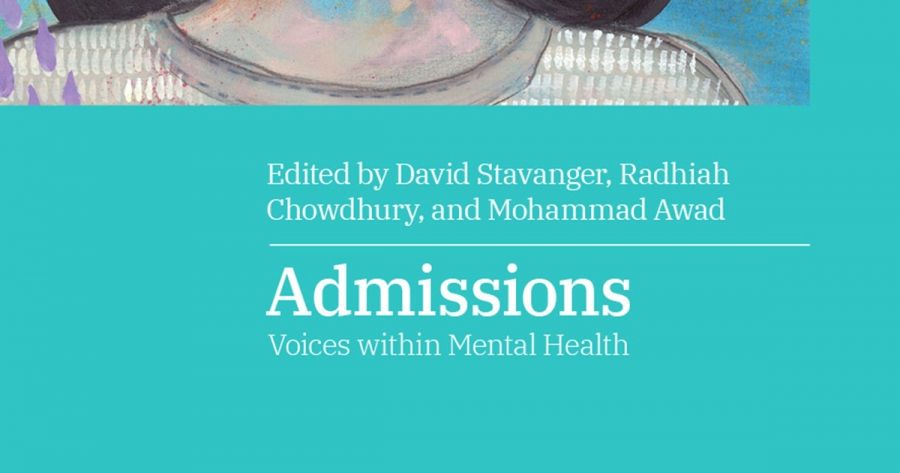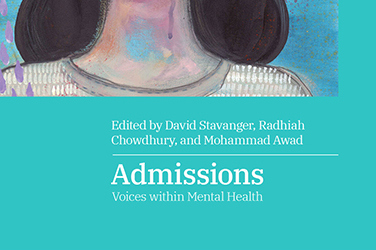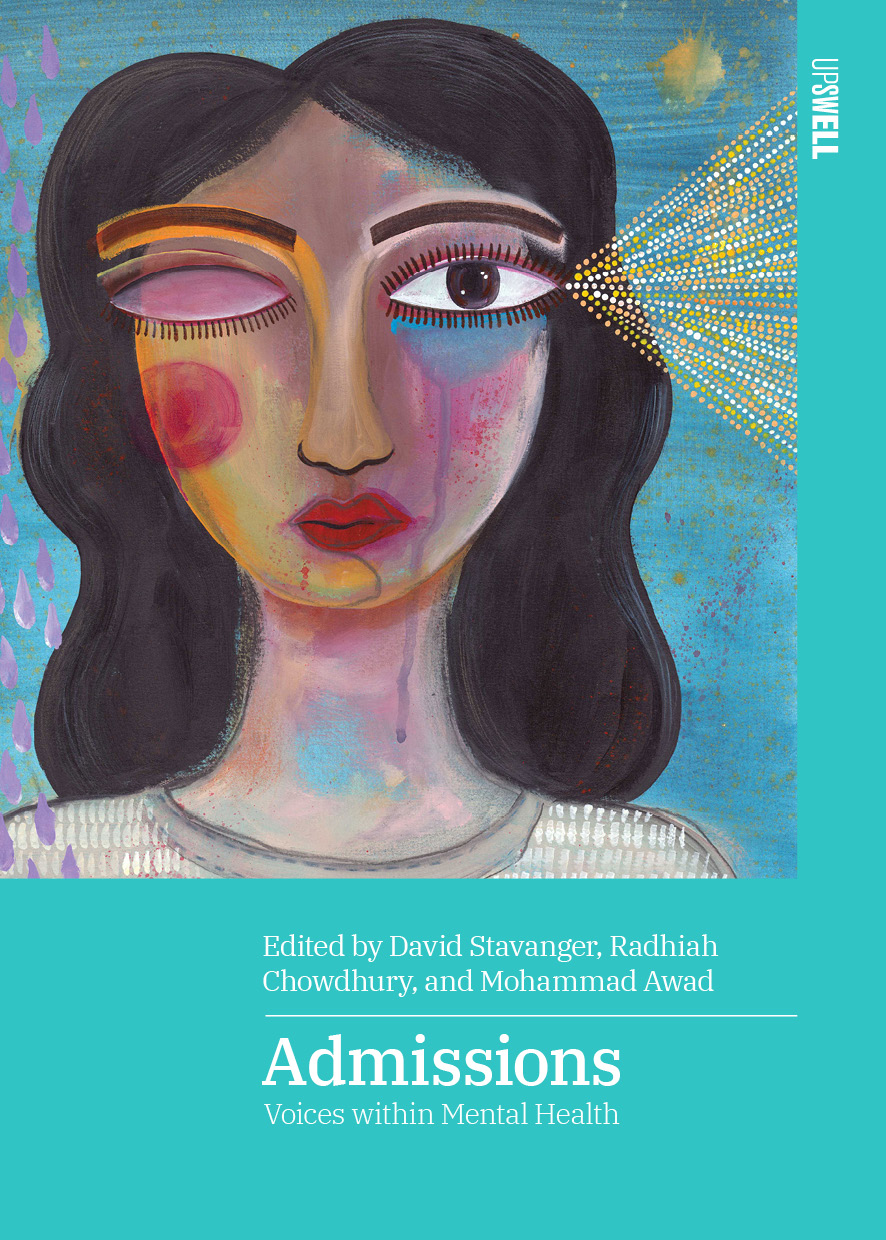
- Free Article: No
- Contents Category: Essay Collection
- Review Article: Yes
- Article Title: 'Decomposed and desired'
- Article Subtitle: A polyvocal show of force and difference
- Online Only: Yes
- Custom Highlight Text:
'There are 206 bones in our bodies / and mine / are just like yours,’ writes Luka Lesson, rejecting the idea of the fundamental difference between the neurotypical and those who fill the pages of Admissions: Voices within mental health. ‘But I’ll be white ochre if I want to,’ the poet clarifies. ‘I’ll be eaten and reclaimed / decomposed and desired / if I want to.’ These words are about difference and dying, but the speaker is not ready ‘to feed the dirt’, and the poem is a resolute stocktake – of bones, of veins which have been named, and of the breaths transliterated here, breaths ‘that I may have never taken / and they / are the best shit / that I ever wrote.’
- Featured Image (400px * 250px):

- Alt Tag (Featured Image): James Dunk reviews 'Admissions: Voices within mental health' edited by David Stavanger, Radhiah Chowdhury, and Mohammad Awad
- Book 1 Title: Admissions
- Book 1 Subtitle: Voices within mental health
- Book 1 Biblio: Upswell, $29.99 hb, 346 pp
- Book 1 Cover Small (400 x 600):

Here is a strident declaration that after decades of patients’ rights the world still wants for patients’ voices or the voices, rather, of those ‘living under the label of psychiatric diagnosis,’ as Pascalle Burton writes. There are three hundred pages narrating routine experiences of neurodivergence. Some are approached warily, from the third or second person, like Helena Fox’s unsettling meditation on dissociating while driving at speed with children. ‘A tiny / snick, and you’ve shucked your skin’; now above the car, now in another galaxy, ‘you do not understand them, they do not understand: / you are not here’. But ‘you must come back,’ ‘stuff / yourself into your skin (what skin), rattle / back inside those bones (what bones)’ to survive the drive. Arriving home ‘you walk through the door again / as you do / as you do’ to find a clangour of spaces and sounds before ‘someone (a child) reaches out’ and in the ‘sweet press of / skin’ the speaker is again whole.
Many yearn for a more secure sense of self. The ‘mad woman in the poem’ by Sandy Jeffs is alone, scarred, scrounging in the streets and reciting Milton, losing herself in others’ stories. She ‘carries the burden of Eve’. She ‘was raped by the Devil / sees maggots wriggling in her stigmata’. She ‘is going to the firing squad next morning / is a character in a Bruegel painting/is an oracle of the dead. ‘The madwoman in this poem is everywoman and the madwoman is me,’ writes Jeffs. Felicity Ward struggles to know when she is sinking and, when sunk (‘ball-bearings sewn into the lining of my skin’) to recall her other life. ‘What I haven’t accepted,’ she writes, ‘is that both parts are the real me and if they could hold hands long enough to understand each other then maybe I wouldn’t still be fighting this damp, suffocating disease.’ She wishes for a yardstick, a ‘body memory’, ‘something to remember me by’. Pascalle and Wendy Burton recount a conversation between themselves and others who have ‘called in’; Wendy is listed among the authors as ‘living independently in the place of her dreams’. Descartes, writes my brother Jonathan Dunk in his ‘Ghost Song’, should have said ‘I think that I’ve thought that I’ve thought that I’ve / thought and repeat when it hurts.’ As Anna Jacobson writes in ‘People Die in Seclusion Rooms,’ ‘I was not there in my self while my body / lay on the bare mattress and screamed / for my return.’
There are awful evocations of generational pain: a daughter living ‘as free as a bird in a cage’, protecting her parents ‘from the knowledge that one day she would fly away’ (in paired words from daughter and father Mary and Stuart Baker); a father, ‘in that sweet brief moment when he burned / too bright / and collapsed into himself’, in Krissy Kneen’s ‘Core Sample’. ‘Madness runs in the family like greyhounds,’ writes Samson J.L. Soulsby.
There are also elegant metaphors, clearly hard won. ‘The years that are lost / are not lost / just cut up / and waiting / to be re-edited,’ writes Kneen, and in Omar Musa’s ‘Paleochannel’ the speaker traces rivers of gold through alcoholism and self-hatred, within the conceit of kintsugi, the Japanese art of repairing broken pottery by filling the cracks with molten metal to make something still more beautiful (‘this heart that slowly revolves on the potter’s wheel’).
In the history of mental health, silence has hung close and claustrophobic. Radhiah Chowdhury’s mother told her, fearfully, ‘Don’t tell anyone about this.’ Her pen confiscated in isolation, Anna Jacobson wrote on the floor with her cold tea. ‘My words were not noted, no-one wanted to listen to the woman / who cannot hear herself.’ But in this volume these words are noted and, being heard, signal a need for more robust engagement. ‘It is my sincere hope that the reader knows they bear some responsibility,’ writes Twyford-Moore, ‘that they are to do some of the work.’ The work might be something like what Fiona Wright describes in her essay about two neurodivergent people finding each other and dispensing with platitudes, remonstration, and blame. ‘We both know, intimately and all too well, that most of the time there’s nothing anyone can do.’ They simply stay, sometimes speaking, sometimes silent, understanding and remaining.


Comments powered by CComment